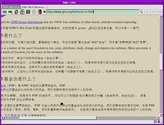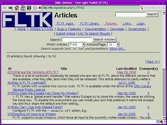Lightweight, Linux-compatible browser evolves
Oct 16, 2008 — by Eric Brown — from the LinuxDevices Archive — 2 views The eight-year-old Dillo project has released version 2.0 of its Linux-compatible, ultra-lightweight HTML browser for embedded systems, antiquated PCs, and other low-powered devices. Dillo 2 adds support for anti-aliased text, multiple languages, and tabbed browsing, while improving table rendering and lowering memory usage, says… the project.
The eight-year-old Dillo project has released version 2.0 of its Linux-compatible, ultra-lightweight HTML browser for embedded systems, antiquated PCs, and other low-powered devices. Dillo 2 adds support for anti-aliased text, multiple languages, and tabbed browsing, while improving table rendering and lowering memory usage, says… the project.
(Click for larger view of dillo 2 screen capture)
Dillo is a very lightweight browser that loads web pages fast enough to poke your eye out, almost, even on the humblest hardware. It supports a subset of HTML, CGI forms, SSL, and cookies (which it denies, by default). Traditionally, it has not been very practical for browsing the modern Internet, due to missing support for Javascript, frames, and HTTPS, among other things. However, since it supports CGI forms, it has been suitable for survey kiosks and other closed, “walled garden” applications. Dillo has also been popular with web developers due to its concise HTML error reporting, available as a right-click menu option. And, through the years, Dillo has been tapped by a long list of “ultra-light” Linux distributions, including Damn Samll Linux, Antix (a MEPIS derivative), Mustang Linux (fork of Buffalo Linux), and VectorLinux (Slackware-based).



Dillo 2.0 screen captures showing (l-r) an OpenMoko build, tabbed browsing and Chinese character support, and FLTK2 compiled with antialiasing disabled
(Click on either to enlarge)
With version 2.0, the browser moves from GTK+ to FLTK, a change that lowered memory usage, the project says. On a Debian Lenny test system with 1GB or RAM, we found that opening Dillo2 used about 2.5MB of RAM. The browser took 23MB to load the LinuxDevices homepage, and about one additional MB for each tab loaded after that.
Other major new features include:
- Tabbed browsing
- Antialiasing
- Different character sets
- Accepts compressed pages
- Control over image loading
- Smaller footprint
- Near 50 percent smaller memory usage
- Fewer dependencies
- Better table rendering
- Bug fixes
- Improved GUI
As usual, the Dillo project is actively welcoming new developers to help with future releases.
Availabilityhere.
This article was originally published on LinuxDevices.com and has been donated to the open source community by QuinStreet Inc. Please visit LinuxToday.com for up-to-date news and articles about Linux and open source.